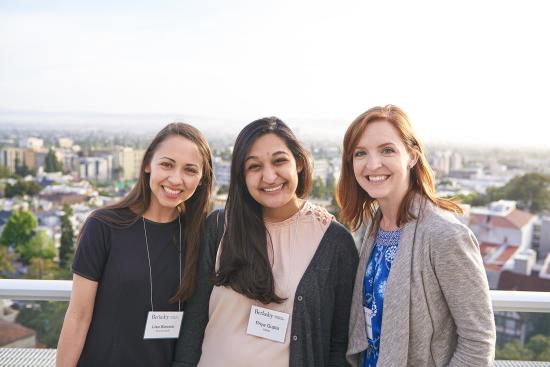Supported by a grant from the UC Berkeley Chancellor’s Advisory Committee on Student Services and Fees (CACSSF) Discretionary Fund, the School of Information is launching a pilot Leadership Development Program (LDP) for Fall 2021, to increase the advancement of women and non-binary students in technology leadership roles by providing an environment that affirms and reflects intersectional experiences.
This program is geared toward mid-career professionals who are part-time students in the Master of Information and Data Science (MIDS) and Master of Information and Cybersecurity (MICS) degree programs, allowing students to directly apply their learning in the LDP to the context of their work. The 2021–22 LDP pilot program will be open to 25 graduate students.
I School Director of Career Services and Alumni Relations Rebecca Andersen and Senior Career Advisor Laurie Haskell-Woerner are spearheading the program because while they have witnessed many professional students and alumni succeeding in individual contributor and mid-management roles, they see a lack of representation of women-identified people in senior leadership positions.
“While our students build on their technical expertise in the classroom,” said Andersen, “our hope is that the LDP program provides a chance to engage in authentic leadership development, build connections with diverse leadership role models, and learn strategies for uplifting women and non-binary individuals in STEM.”
The I School LDP will include a mentorship program, workshop series, employer connections, self-assessments, and peer coaching. Participants will be guided through developing a personal vision and leadership style, navigating barriers and biases facing women in technology (e.g., stereotype threat, imposter syndrome, and implicit bias), practicing leadership skills, and leading multicultural teams and technology initiatives. The program will include service-learning, connecting participants with junior Berkeley women who aspire towards leadership roles.
Women alumni who work in executive leadership roles were critical partners in crafting the grant proposal, lending insight from their experience and leadership journey. Each alumna consulted noted that they would like to remain involved in the program implementation, particularly in ensuring this program concretely addresses the unique challenges for women in leadership and women in technology that can lead to women facing double barriers in technology leadership positions.
I School students, including the diversity, equity, inclusion, and belonging (DEIB) student representatives provided critical feedback and influence on program design, including the addition of emotional intelligence and a focus on situational leadership. Srishti Mehra, the MIDS DEIB representative said: “Addressing the lack of representation in leadership positions is very important both for the individuals and for companies. A step towards it with programs like these, which will not only provide training to prepare us for such roles but also a network to share experiences with and learn from each other, is a brilliant idea.”










